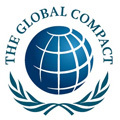 10 April 2014: The UN Global Compact has launched a series of issue briefs on the post-2015 development agenda and Sustainable Development Goals (SDGs). The briefs address the following priority issues: climate and energy; education; food and agriculture; governance and human rights; health; infrastructure and technology; peace and stability; poverty; water and sanitation; and women’s empowerment.
10 April 2014: The UN Global Compact has launched a series of issue briefs on the post-2015 development agenda and Sustainable Development Goals (SDGs). The briefs address the following priority issues: climate and energy; education; food and agriculture; governance and human rights; health; infrastructure and technology; peace and stability; poverty; water and sanitation; and women’s empowerment.
The priority areas were identified through consultations with Global Compact LEAD companies and other stakeholders. The briefs aim to highlight the role that the business community will play in achieving the SDGs, and its willingness to support governments and civil society in realizing sustainable development. Each brief identifies relevant business platforms for action and partnership, and public policy and enabling incentives that can facilitate increased business engagement.
On climate and energy, corporate efforts are bringing electricity to poor and underserved households, and major energy producers are increasing efficiency and renewable sources. Some public policy measures identified for increased business engagement include: implementing and harmonizing technical standards in transportation, housing and energy consumption; establishing long-term national energy plans to reduce the risk for companies making long-term investments; employing energy pricing measures; and implementing skills training programmes to facilitate the shift from fossil fuels to renewable energy industries.
Business identified education as the first or second top priority for a post-2015 development agenda. Businesses coordinate with secondary and tertiary schools to prepare graduates to fill job opportunities, resulting in lower rates of unemployment and higher productivity.
On food and agriculture, the brief notes that: enhanced harvests, food processing and distribution will help eradicate hunger; and renovating rural sectors is key to advancing prosperity. It says business is contributing to these efforts by helping to improve agricultural operations, develop new crops and train farmers in new technologies. To unlock the private sector’s full potential in this area, the following enabling frameworks and incentives will be critical: establishing or strengthening extension services; connecting farmers to local, national, regional and global markets; employing taxes and regulations to support investment in agriculture and secure property rights; and setting aside plots where large-scale farming can be developed.
On governance and human rights, the brief explains that: businesses can contribute by respecting human rights in the workplace and when dealing with customers and suppliers; and the private and public sectors share in the responsibility of addressing corruption. From the business view, governance requires the rule of law, an enabling political environment for economic development, regulation with minimum bureaucracy and transparency. In additions, governments should support existing and improved agreements on trade, investment and migration.
On health, corporations have played a key role in the global campaign to make HIV/AIDS medications more affordable, and the Global Fund to Fight AIDS, Tuberculosis and Malaria. The brief describes that key issues faced by the private sector – regulatory harmonization, robust intellectual property, accelerating uptake of new products and increasing vaccine coverage, among others – can be solved by easing commercial entry barriers, addressing taxes and duties imposed on medicine, and raising funds using international capital markets and new financial products, such as the International Financial Facility for Immunisation (IFFIm).
On infrastructure and technology, the brief explains that: cost recovery will attract more long-term investment in energy, transport and water, and encourage conservation; and governments can help build credit-ratings firms capacity to assess risk in new projects, backed by multilateral development bank (MDB) support.
On peace and stability, companies are looking at how to defuse social conflicts earlier or, in post-conflict situations, to work towards stability, through providing basic needs, and promoting and respecting fair land rights. Public policy steps to support an enabling environment for peace include: incentivizing responsible investment through support of SMEs, microfinance entities, and availability of credit and affordable debt; promoting investment facilities and risk coverage schemes to encourage private investments; and facilitating a better understanding of business opportunities in fragile countries.
On poverty, companies are increasingly adopting new policies and practices that are inclusive of the poor, and micro-credit organizations and larger investment institutions are extending credit to lower income or traditionally marginalized groups. For example, several multinational companies with agricultural value-chains have worked with Oxfam to develop and test the Poverty Footprint methodology. This brief recommends establishing regulations to increase opportunities for entrepreneurship among those working in the informal sector and smallholder farmers; and setting fair and reasonable immigration laws.
On water and sanitation, the brief describes how more companies are embracing “corporate water stewardship” practices that expand traditional ideas of water management to include water-related impacts within communities and the river basins and ecosystems in which they operate. Business-oriented initiatives, such as the UN Global Compact’s CEO Water Mandate, address the private sector’s role regarding water and sanitation challenges, and in some cases, are moving towards highly localized solutions. The CEO Water Mandate’s Water Action Hub, for example, assists stakeholders to identify potential partners to improve water management in regions of strategic interest. Recommendations include: developing longer-term water planning; and establishing fair and appropriate valuation of water, while ensuring access to water and sanitation.
On women’s empowerment, the brief describes business-oriented initiatives that address the role of the private sector in promoting the rights and empowerment of women and girls, such as the Women’s Empowerment Principles (WEPs). WEPs highlight the importance of creating decent work opportunities, and stress the need for laws and policies that promote equality, including the right to access and ownership of productive assets.
The briefs were presented to the Co-Chairs of the Open Working Group (OWG) on SDGs. [UN Global Compact Issue Briefs]